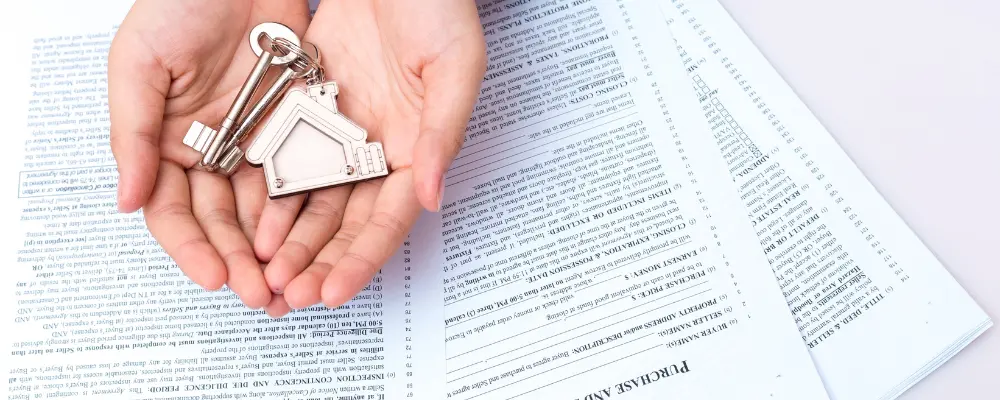When buying or selling a house, you frequently hear the term “property deed.” However, many people may find it difficult to completely understand the meaning of this term. Property deeds are commonly used for all sorts of real estate.
In today’s Brick & Bolt blog, you will learn about property deeds, their key elements, the transfer process, and the importance of proper documentation.
What is a Property Deed?
A property deed is a document that transfers legal ownership of real property, such as land parcels and construction, from a seller to a buyer. The seller is listed as the grantor in the deed, and the new owner is listed as the grantee. Along with the names, information such as the sale price or if the property was gifted is given.
For those involved in Indian real estate transactions, understanding escrow transactions is also essential.
Key Elements of a Property Deed

A property deed document is typically one or two pages long, with the contents based on the type of deed, property type, and location. The following are the key elements of a property deed document:
- Property Description: This includes the property boundaries and any other essential facts concerning the property type, such as neighbouring roads, utilities, or the name of the subdivision
- Buyer and Seller Information: This includes the names and addresses of the parties purchasing and selling the property.
- Seller’s Signature: To make the document official, the seller or person transferring the property must sign it with their full name. Some deeds demand signatures from both the buyer and seller.
- Granting Clause: The clause that transfers the title of the property and specifies the buyer’s rights.
- Consideration Clause: The provision that states how much money the seller received for the sale of the house.
Types of Property Deeds
There are numerous types of property deeds. The following are the major types of property deeds.
- Warranty Deed
- Bargain and Sale Deed
- Quitclaim Deed
- Special Purpose Deeds
Warranty Deed
A warranty deed is the type of deed used when obtaining a mortgage, and it offers more protection to the buyer than other deeds. Warranty deeds come in two types:
General Warranty Deed: It provides the best protection for the buyer by ensuring that the seller has the legal right to transfer the property and that there are no liens, debts, or encumbrances.
Special Warranty Deed: It provides fewer safeguards. Although the deed ensures that there were no liens or encumbrances on the property while the seller possessed it, it does not guarantee that these encumbrances did not exist prior to the seller’s ownership. The most common use of this sort of deed is to transfer an estate or trust.
Bargain and Sale Deed
A bargain and sale deed simply declares the seller’s title to the property and does not protect the buyer against liens or obligations. This sort of deed is most common in tax sales and foreclosures, where the property’s history may be unknown.
Quitclaim Deed
A quitclaim deed occurs when the seller “quits” any claims to the property. The deed transmits any ownership interest the seller may have in the property, but it does not guarantee that such ownership exists.
Special Purpose Deeds
Special purpose deeds are commonly used in court for specific conditions. The most important types of special purpose deeds are:
Administrator’s Deed: When a person passes away without a will, the administrator deed will be in use. A court will appoint an administrator to handle the decedent’s assets, and an administrator’s deed document can transfer real property title to the grantee.
Executor’s Deed: This is used when a person passes away with a will. The estate’s executor liquidates the decedent’s assets, and an executor’s deed may be used to transfer title of real property to the grantee.
The Sheriff’s Deed: It is delivered to the successful bidder at an execution sale to fulfil a judgment against the property owner. The grantee acquires the judgment debtor’s title.
Tax Deed: It is created when a property is sold due to outstanding taxes.
Gift Deed: It transfers ownership of real property for no or minimal consideration. In some places, the gift deed must be documented within two years, or it is void.
The Importance of Proper Documentation for Property Deeds

Proper documentation, particularly about property deeds, is vital for various reasons:
Legal Protection: A well-prepared and properly conducted deed protects both the buyer and the seller by clearly defining their respective rights and responsibilities.
Title Clarity: Recording the deed document guarantees that the chain of title is clear, which reduces the chances of future ownership disputes.
Financing and Insurance: Lenders often require a clear title before providing financing, and title insurance policies usually count on the facts recorded in the deed.
Tax Implications: Property deeds, such as land registry deeds, might have financial consequences, such as transfer taxes or property tax assessments, so proper documentation is essential for effective taxation.
Conclusion
Proper knowledge of property deeds is very important for anyone who belongs to real estate transactions. Either for buying or selling a property, it is a must and should. Proper documentation of property deeds is critical for ensuring legal protection and title clarity and facilitating financing and insurance. Property deeds are essential for managing the tax-related procedures associated with property transactions. Buyers and sellers can more easily handle the convolutions of real estate transactions by getting to know the details and importance of property deeds. This understanding helps proceed with the transfer of property ownership securely without any issues. Additionally, it’s crucial to draft contracts related to construction projects carefully to avoid common mistakes.

